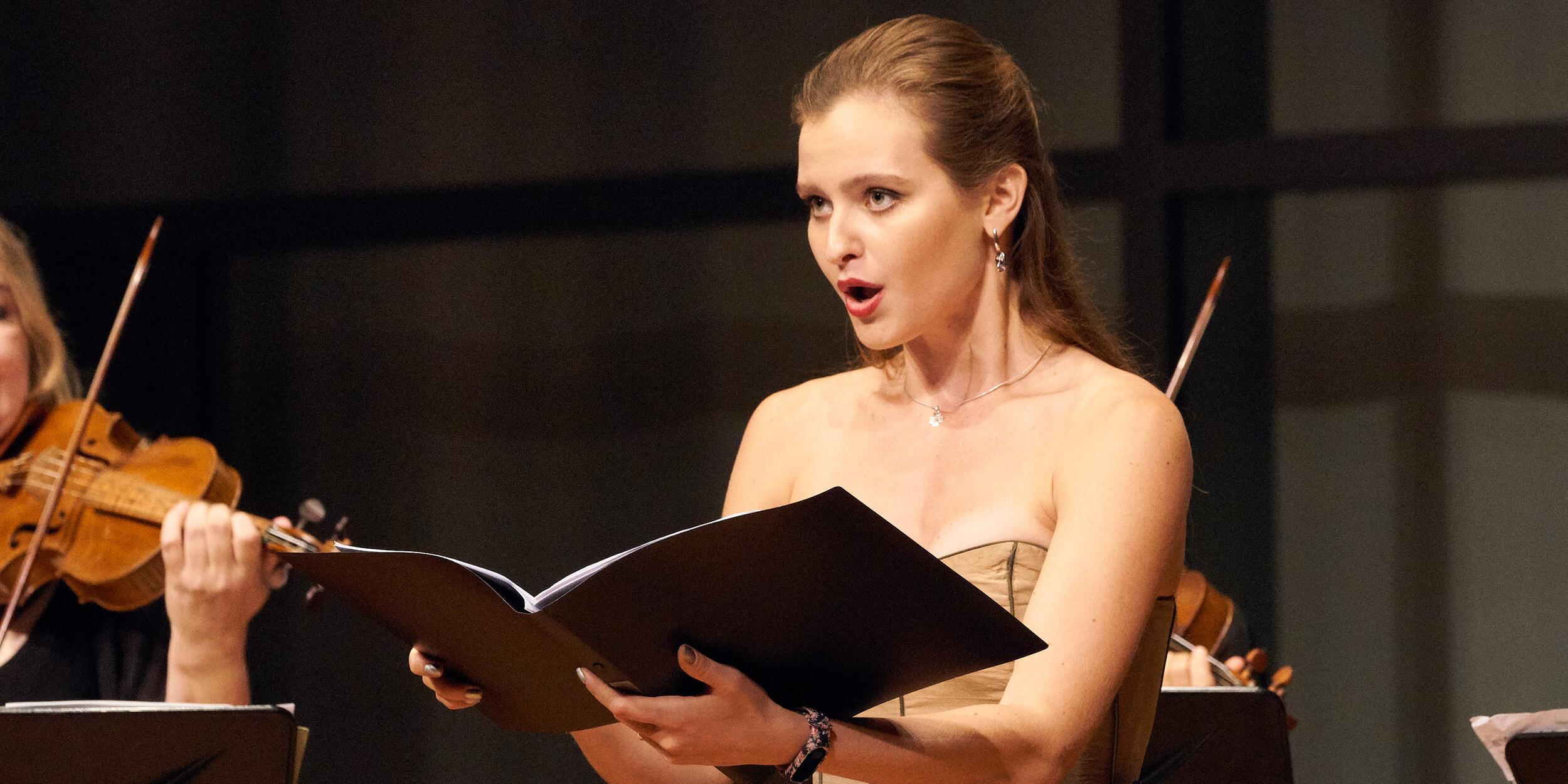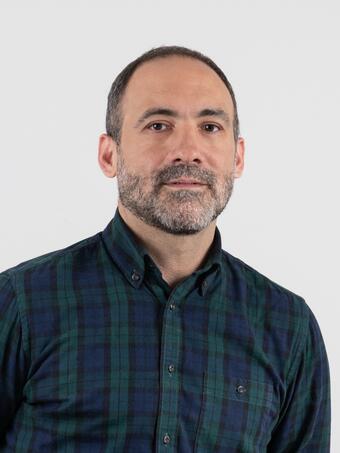Vocal Studies in Early Music

Overview
Students of this master's programme will further develop their vocal technique at a highly professional level, deepening and expanding their technical skills through a specialisation in Early Music as well as developing and realising their own artistic ideas. An essential part of the course is the performance of roles in baroque opera productions and the participation in concert projects.
Department of Studies and Examinations
+43 676 88122 492 studienabteilung@moz.ac.at
Length of course
4 semesters / 120 ECTS-AP
Language
German
Application period
1.2.–28.2.2025
Auditions
summer semester each year
dates see at "Audition dates"
overview of all dates
Downloads
General information
This practice-oriented study programme enables students to expand and deepen the artistic and academic skills they have acquired in a subject-related bachelor's programme.
The artistic study programme qualifies students for the following professional fields:
- Soloist
- Chamber musician (e.g. in a choir or early music ensemble)
- Freelance artist
Students are trained to become mature artistic personalities who, on the basis of a broad knowledge of repertoire, are able to set individual artistic priorities. In the course of their studies, they develop ensemble repertoire in various instrumentations (purely vocal or vocal-instrumental) with special attention to historical performance practice of different periods and regional styles, expand their knowledge in historical and cultural areas relevant to the singing profession, and deal with surviving sources on historical performance practice as the basis for historically informed interpretation.
The goals of this MA in Performance at the Mozarteum University are artistic maturity and independence, critical self-reflection and evaluation, and the artistic and academic ability to interpret musical works from all periods. The MA in Performance will equip students to pursue their chosen profession and to fulfil artistic, pedagogical and organisational tasks within cultural life. Upon completion of the master's programme, students should:
- be able to master their instrument, the voice, at the highest level and present themselves professionally
- be free and independent in their artistic work
- be capable of dealing critically with artistic and academic questions
- be able to make music professionally in a choir or ensemble
- be able to work in a chamber music formation and/or have acquired in-depth knowledge of various vocal techniques
- have acquired in-depth knowledge of choral literature and mastery of the relevant choral parts
- have acquired in-depth knowledge and mastery of solo and chamber music literature from various periods
- possess in-depth knowledge of stylistics and repertoire
- have mastered the techniques of acadmic research and writing, and be able to analyse, interpret and write about artistic content in a grounded manner
- he able to use audiovisual media for self-presentation (competition submissions, demo recordings, internet presentations etc.)
- have gained insights into the areas of physical and mental health maintenance, self-management and performance optimisation
- have further developed their individual interests beyond their own subject area through targeted consolidation in the context of elective subjects, in the spirit of lifelong learning
The four-semester master's programme is modular in structure. Each module comprises teaching and learning content that has been combined to form thematically and didactically meaningful units of study. The names and content descriptions (study objectives) of the individual modules, the number of ECTS credits to be achieved for each module, and the type of performance assessment are specified in the curriculum. The module descriptions refer to the corresponding learning outcomes and competencies.
The Master's programme is a face-to-face programme and cannot be offered - not even in part - as a distance learning programme. The courses from the Principal Study, as well as in other One-to-One Tuition, are designed to build upon each other. Prerequisite for enrolment in courses from the Principal Study or One-to-One Tuition is a positive evaluation of the previous semester (from the second semester onwards).
The curriculum provides an overview of the courses to be completed, which are grouped into modules.
The courses are visible online in Curriculum Support:
Admission to this MA programme requires the completion of a subject-related Bachelor's degree (BA) or another equivalent degree at a recognised Austrian or foreign post-secondary educational institution (e.g. university, college) (§ 64 Abs. 3 UG 2002).
For admission to the MA programme "Vocal Studies in Early Music", a BA degree (or other equivalent degree) in Vocal Studies (performance) or Vocal Studies in Early Music is required. Admission with a pedagogical degree such as classroom teaching or vocal pedagogy is NOT possible.
A prerequisite for starting the course is also the successful completion of an audition. Auditions take place once a year and consist of an examination to determine artistic aptitude and, if necessary, proof of German language skills. All information about the audition can be found under “Information about the admissions process” further down on the page.
PLEASE NOTE: You can only apply for study programmes for which you have not yet obtained a degree!
Students of the Master's programme are encouraged to complete a semester abroad. Semesters 2 and 3 of the degree programme are particularly suitable for this. In addition to subject-specific competences, a study period abroad can also lead to the acquisition and deepening of:
- Subject-specific foreign language skills
- General foreign-language skills (language comprehension, conversation, etc.)
- Organisational skills, through independent planning of everyday student life in international administrative and university structures
- Knowledge about international study systems, as well as broadening one's own subject perspective
- Intercultural competences
Examinations and assessments taken during studies abroad can be approved by the Director of Studies as equivalents to compulsory subjects, elective sujects or free elective subjects required by the Mozarteum University for your degree course. The documents required for the approval procedure are to be submitted by the applicant immediately after their exchange semester.
Details at International Affairs.
Information on the admissions process
Admission to an MA Performance programme requires the completion of a relevant bachelor's degree (BA) or other equivalent degree at a recognised domestic or foreign post-secondary educational institution (e.g. university, college) (§ 64 Para. 3 UG 2002).
A prerequisite for admission to this university course is also the successful completion of an audition. Registration for an audition is completed online via Muvac and requires candidates to upload documents proving their eligibility for the course. An invitation to audition will only be issued after the necessary documents have been submitted in full and approved by the admissions office.
PLEASE NOTE:
- Document checks can take up to 6 weeks! Early registration is therefore recommended.
- Applicants can only apply for degree programmes for which they have not yet obtained a degree!
Applicants whose documents have been approved will be invited to the on-site audition. This consists of an instrumental audition and, if necessary, a test of German language skills.
The following documents must be uploaded in the online application form:
- BA certificate or degree certificate of a relevant degree programme, if the degree programme has already been completed
- Confirmation of current enrolment if the degree programme has not yet been completed (the certificate must be submitted prior to enrolment!)
- Overview of subjects and grades (Transcript of Records) of the BA degree programme
- Official confirmation of the principal study, if this is not evident from the other documents (e.g. "Bachelor of Music" is not sufficient!)
- If further previous studies have been completed, a full overview of subjects and grades (Transcript of Records) of all artistic and pedagogical Master's and diploma studies must also be uploaded.
Format of documents
- The documents can be uploaded as PDF in the application form.
- If the documents are not available in German or English, an official translation must be submitted.
Please note:
Applicants who pass the audition and are offered a university place must ensure that their documents meet the certification requirements by the time of their enrolment at the latest.
2. Once in the MOZonline account: fill in the mandatory statistics UHstat1 (pre-registration for studies) and make a note of the application number that is sent by email upon submission of this information.
3. Create an application account in Muvac
4. Fill out your own profile in Muvac (minimum requirements: personal data, information on expertise matching the desired degree programme, in the CV: current employment and information on previous training)
6. Fill out the application form in Muvac ("Apply now"), being sure to enter your application number (see step 2) or Austrian matriculation number in the appropriate field
Please take a look at the FAQs about registration in Muvac if you get stuck at any of the steps.
- Online registration during the application period via the application portal Muvac (Please note: Registration is only possible if all required information and documents have been submitted!)
- Once the online application has been processed: invitation to on-site audition. The invitation will be sent via Muvac.
- The invitation to audition on-site must be accepted or rejected in Muvac; information on the audition programme in the principal study must be provided if required by the instrument/degree programme in question
- participation in the on-site audition
- Upon passing the audition and being offered a place: invitation to enrol in the degree programme
- Enrolment (in person) during the general admission period
The programme presented must include pieces typical of the early music repertoire from several styles or periods, taking into account technical and stylistic diversity:
At least three works of different styles in at least two different languages must be prepared
- A monodic work from the first half of the 17th century. (e.g. by C. Monteverdi, F. Cavalli, H. Schütz, H. Lawes)
- A recitative (semplice/secco, no accompagnato)
- An aria from the 18th century (either from a mass or passion by J.S. Bach or from an opera by G.F. Händel or A. Vivaldi)
- A spoken piece (poem, excerpt from a dramatic work, novel) in the candidate's own native language
The audition panel will select a performance time of approx. 15 minutes from this programme. The vocal performance will be follwed by an interview with the audition panel.
The candidate may bring a continuo player if they wish, but a harpsichordist and harpsichords in A=415 Hz and A=440 Hz are available.
All applicants whose first language is not German must prove their German skills by the time of enrolment at the latest.
- Required language level: at least A2 (Common European Framework of Reference for Languages GER 2001)
- Information on the approved language certificates can be found HERE
Exam A - Audition to determine artistic aptitude: 18.6.2025
Exam B - German language skills: certificate (to be presented upon enrolment)
Please note that the Mozarteum University Salzburg offers various support options at the time of your audition and during your studies if you have a disability or a chronic illness.
If this applies to you and you would like to take advantage of counselling, please contact Claudia Haitzmann: claudia.haitzmann@moz.ac.at or +43 676 88122 337.
Any questions?
You can find more information about starting your studies here:
